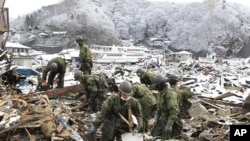Thousands of Japanese and American military personnel joined together Friday in a final three-day sweep to search for those still missing from last month's massive earthquake and tsunami.
The operation involves 120 aircraft and 65 ships and will cover the three prefectures hit hardest by the March 11 disaster. More than 11,000 people are confirmed dead, with more than 16,500 still missing. But the search teams will stay out of a 30-kilometer zone around the radiation-leaking Fukushima nuclear plant.
Workers have been struggling since the quake to bring the damaged plant under control. Chief government spokesman Yukio Edano said Friday that current circumstances meant that it would be a "reasonably long" period of time before those evacuated from the nuclear-threat zone would be allowed back to their homes.
Edano also confirmed reports that the groundwater around the plant was contaminated with radiation many times higher than normal, and that testing on cattle had turned up a low-level sample of radioactive-contaminated beef.
|
Listen to reporter Martyn Williams discuss the effort to find Japan's missing with VOA's Sarah Williams
|
In an address to parliament Friday, Prime Minister Naoto Kan criticized the plant's operator, Tokyo Electric Power Company, for having inadequate defenses against a tsunami. But, the Japanese leader assured the public that there is no danger of contamination outside the exclusion zone around the nuclear plant.
Nuclear industry experts from the U.S., France and elsewhere are in Japan Friday, or heading there, to offer assistance to TEPCO. Specialized robots also are being sent to help where it is too unsafe for humans.
Authorities are considering what to do with 1,000 dead bodies near the plant, saying it may be too dangerous to collect them because of fears the corpses are too contaminated with radiation. Police sources warn that if the families of the victims cremate the bodies, as is the tradition in Japan, it could release more radioactivity into the environment.
Prime Minister Kan was scheduled to visit several tsunami and earthquake affected areas on Saturday, April 2.
Some information for this report was provided by AFP, Bloomberg and Reuters.















